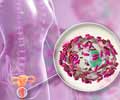In a new research, scientists in Montreal have uncovered a new anti-cancer, anti-infection response control mechanism that could change the way cancers and infectious diseases are treated.
In a new research, scientists in Montreal have uncovered a new anti-cancer, anti-infection response control mechanism that could change the way cancers and infectious diseases are treated.
Dr. Andre Veillette, a researcher at the Institut de recherches cliniques de Montréal (IRCM), and his team led by postdoctoral fellow Dr. Mario-Ernesto Cruz-Munoz, identified one of the basic mechanisms controlling NK ("natural killer") cell activity.NK cells, which are produced by the immune system, are responsible for recognizing and killing cancer cells and cells infected by viruses, such as viruses causing hepatitis and herpes.
NK cell deficiency is linked with a higher incidence of cancers and serious infections.
"Our breakthrough demonstrates that a molecule known as CRACC, which is present at the surface of NK cells, increases their killer function," Nature quoted Veillette as saying.
Using mice, the researchers have shown that CRACC greatly improves the animals' ability to eliminate cancer cells such as melanoma (a skin cancer) and lymphoma (a blood cancer).
Mice lacking the CRACC gene, generated in the laboratory, were found to be more susceptible to cancer persistence. Conversely, stimulation of CRACC function was found to improve cancer cell elimination.
Advertisement
Increasing the activity of CRACC by gene therapy or drugs could become an option in the future to stimulate the killer function of NK cells, and to improve their capacity to destroy cancer and virus-infected cells.
The discovery opens new avenues for the treatment of cancers and viral infections.
The study is published in the upcoming issue of the prestigious journal Nature Immunology of Nature Publishing Group.
Source-ANI
SRM









